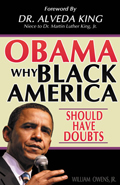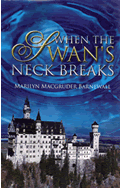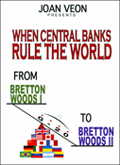By
Marilyn M. Barnewall
November 22, 2009
NewsWithViews.com
One of the biggest economic dangers we face right now is the attempt by Congressional political hack liberals like Chris Dodd, Barney Frank, Nancy Pelosi, and Harry Reid, who are joined by Lawrence Summers, Timothy Geithner, Ben Bernanke, Robert Rubin, and Henry Paulson to manipulate regulatory controls within the financial services industry.
They walk in the footsteps of the winner of the Nobel Peace Prize, Barack Obama. This Administration wants the financial services industry to be regulated by a core group whose salaries are paid by the financial services industry. He wants to give more power and almost complete control of the various financial regulatory bodies to the same Federal Reserve System that is so out of touch with how things work in the real world economy it didn't see a crisis coming. If a little old lady sitting on a mountain in Colorado could see it years ago, why couldn’t they?
Why is this important? They can't accomplish socialized medicine or world government without it, that's why.
The
independent banking community in this country is one of the best defenses
America has against the forced centralization of our banks via international
regulatory oversight. As long as we have too many independent commercial
banks to be easily regulated, we have an effective blockade between socialism
and capitalism.
It is interesting to note that the regulatory structure the Administration
recommends appears designed to destroy independent banks. They're doing
it under the cover of hype about nationalized health care. Some things
never change – including the liberal penchant for using fear:
“They’re afraid of health care, so keep that on the front page while we create even more dangerous legislation.” Isn’t “fear” how the Patriot Act got passed?
Health care is a critically important topic, but if financial industry regulatory controls cause independent banks to fail, say "hello" to the road Rome once took. Say "hello" to third world status - with or without health care. Who can afford doctors in a banana republic?
The second most important question we need to answer: "What must we do?" The most important question: "What must we NOT do?" One thing we must NOT do is build a bigger wall than politicians have already constructed between access to bank credit and America's independent businesses. The regulatory structure currently recommended by the Obama Administration builds such a wall.
Why is this important? From 80 to 90 percent of America is employed by independent business, not IBM or Proctor & Gamble or Government Motors. Independent banks are what we need to protect because they serve independent business! Money center banks (too big to fail guys) like big loans made to big companies, not small loans made to independents. It is our independent banks we need to protect - and we had better get to it because they're unnecessarily falling like flies.
According to the Federal Reserve Bank of St. Louis, as of June 30, 2009 there were 6,898 commercial banks in the United States - and several have been closed since then. That sounds like a lot - unless you look at history. As of June 30, 1984, for example, there were 14,369 commercial banks. By 1994, that number had been pared down to 10,623. Now we have 6,898. It doesn't take a mathematical genius to determine that over half of the commercial banks doing business in 1984 have either been absorbed by bigger banks, or are otherwise out of business.
According to statistical data provided by Canadian bank officials, as of February 2009, there are 21 domestic commercial banks in Canada. Additionally, there are 25 foreign-owned commercial banks.
America's neighbor to the North once had over 900 caisses populaires (similar to credit unions, mostly in Quebec). By 2007 consolidation reduced this number to 525 credit unions and caisses populaires outside of Quebec. In essence, Canada (including Quebec) has about 1,000 financial institutions that require regulatory control. Of that group, only 21 are domestically-owned commercial banks (compared to our 6,898).
Why are Canada's numbers important? First, because these numbers explain why it has been so much easier to bring socialized everything to Canada than to the U.S. For example, before nationalized health care can be successfully implemented, the financial sector must first be compact… easy to control. Second, Canada's statistics compare favorably to Europe's banking industry. While America has 6,898 commercial banks which must be regulated - audited by the Office of the Comptroller of the Currency (OCC) or State Banking authorities and monitored by the Federal Deposit Insurance Corporation (FDIC) and the Federal Reserve System (FRS) - most other nations have far fewer commercial banks that must be regulated and audited than does the U.S. Having fewer financial institutions to regulate makes it easier for governments to totally control the banking industry.
The independent banking community in this country is one of the best defenses America has against the forced international centralization of our banking industry. Regulatory controls must be centralized – which is what the Obama Administration wants to do – before the financial services industry can be "internationalized." The large number of independent commercial banks in America is helping prevent that.
Washington needs to do nothing that will make access to credit more difficult for independent businesses. That's another fact, not an opinion.
I seldom agree with socialist/independent Representative Bernard Sanders of Vermont, but he has it right on this issue. "If it's too big to fail, it's too big to exist." Sanders has introduced legislation directing the Treasury to identify and break up the "too big to fail" banks within 90 days.
No mega-bank's size should exceed $50 billion. Fed studies have shown banks of that asset size can compete effectively in international markets. Banks say they need $2 trillion to compete. They don't understand competition if it can't be bought. They get their growth via mergers and acquisitions because they can't compete for it in the marketplace.
Peter Wallison, financial analyst at the American Enterprise Institute said, "The result will be devastating for competition. Larger firms will squeeze out smaller ones." He included reference to the nation's community banks which are being closed down because of the antics of the too big to fail crowd.
"The administration's plan would create what are essentially government-sponsored enterprises like Fannie Mae and Freddie Mac in every sector of the financial economy - insurers, securities firms, finance companies, bank holding companies and hedge funds" by designating them as too big to fail, Wallison said.
The Independent Community Bankers of America has asked Congress "to either downsize these mega-institutions or require them to divest sufficient assets so they no longer pose risks to the entire financial system." And they do pose a huge risk. If you like higher taxes and want to continue paying for mega-bank failures, keep doing business with them.
What to do? Stop the mergers and acquisitions by mega-banks such as Bank of America, Citicorp, J.P. Morgan Chase, Wells Fargo, etc. If they are too big to fail, they are also too big to succeed. I disagree with Sanders 90-day limit. It will take longer than that to unwind the complexities inherent in the too big to fail product and organizational structure.
Stop giving not only our nuclear and high tech secrets to the Chinese, stop trying to integrate them into our banking system. As I write this, Chinese and U.S. regulators are negotiating… figuring out how Chinese financial institutions can buy into small and medium-sized banks in the United States – independents.
Terminate
the Comptroller of the Currency, the FDIC and Securities and Exchange
Commission Chairs, the Secretary of the Treasury and the Federal Reserve
System Chairman and replace them with people who understand the difference
between commercial and investment banking. Replace them with people committed
to enforcing regulations and who see the inherent conflicts of interest
that result in failure when the two remain co-mingled. That means abandoning
the Gramm-Leach-Bliley Act of 1999 and re-implementing the Glass-Steagall
Act (the Banking Act of 1933). Get rid of the Commodity Futures Modernization
Act which deregulated the OTC derivatives market.
For more information about how we have been systematically programmed
for financial failure, read the two NewsWithViews articles I wrote a year
ago, "If We Don't Learn from History." Part
one and Part
two.
The best Fed Chairman America has had in many years opposes the proposed centralization of regulatory controls. Obama used Paul Volcker’s name to assure voters he would listen to the sage advice of the man who one other time saved the economy from disaster's door. Instead, the President listens to Lawrence Summers who, as far as I know, has saved no one from anything.
What can you do? If you're banking with one of the “too big to fail banks,” stop. Why bank with the enemy? Move your account – to two or three banks. It takes time for the FDIC to pay money to a bank's customers when bank failure occurs. It’s possible you may only get a portion of the money in your account rather than what you need to pay bills. The closer the FDIC gets to bankruptcy, the more likely their inability to pay bank depositors one lump sum. You need money to pay monthly bills. Thus, you need more than one bank. Stop doing business with the banksters!
You are in control… if only you would realize it!
If you are facing foreclosure on your home, fight it. Get a lawyer and make the bank or mortgage company prove it actually has your Deed of Trust. Your Deed may well have disappeared into one of the mortgage-based derivatives that was sold numerous times. If the institution trying to foreclose on you doesn't have the Deed of Trust, sorry, no foreclosure.
|
Subscribe to the NewsWithViews Daily News Alerts! |
American consumers are being played for fools. If we continue to act the role, we will lose the greatest country God ever put on the face of the earth. Wise up, folks. Stop hitting the “Snooze” button.
� 2009 Marilyn M. Barnewall - All Rights Reserved
Sign Up For Free E-Mail Alerts
Marilyn Barnewall received her graduate degree in Banking from the University of Colorado Graduate School of Business in 1978. She has authored seven non-fiction books about banking, two are listed at Oxford and Cambridge University libraries in Great Britain. Her current book, When the Swan’s Neck Breaks, details the banking problems she foresaw in 2006. Of the 24 predictions made in the book, 22 have happened. It is fiction but readers refer to it as docu-fiction.
Barnewall was named one of America's top 100 businesswomen in the book, What It Takes (Dolphin/Doubleday; Gardenswartz and Roe) and was one of the founders of the Committee of 200, the official organization of America's top 200 businesswomen. She can be found in Who's:Who in America (2005-08), Who's Who of American Women (2006-08), Who's Who in Finance and Business (2006-08), and Who's Who in the World (2008).
Web site:
E-Mail: marilynmacg@juno.com
















